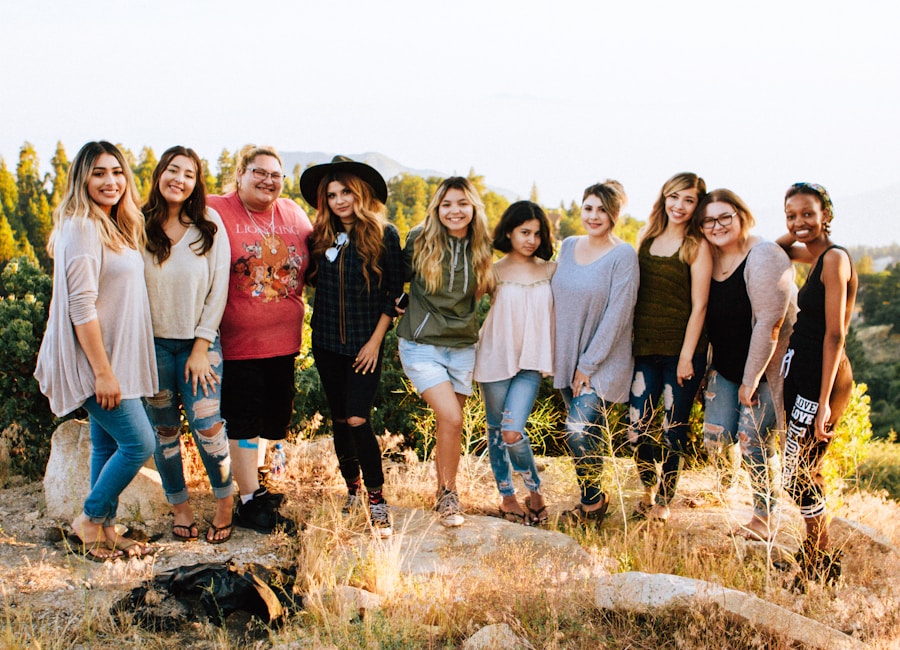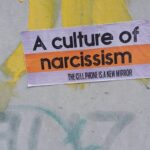ESCAPING THE NARCISSIST
Are you trapped in a toxic relationship? It's time to reclaim your life and find healing. ESCAPING THE NARCISSIST: HOW TO HEAL AND RECOVER FROM NARCISSISTIC ABUSE IN RELATIONSHIPS is your guide to breaking free and starting your journey towards recovery.
Don't let the pain control you any longer. Take the first step today and discover the strategies to overcome emotional abuse and rebuild your life. You deserve happiness and peace.
Start Your Healing Journey TodayNarcissism is a personality disorder characterized by an inflated sense of self-importance, a constant need for admiration, and a lack of empathy for others. While it is often associated with romantic relationships, narcissistic behavior can also manifest in friendships. It is important to recognize these behaviors in friends because they can be toxic and detrimental to our well-being.
The First Sign: Friends Who Constantly Seek Attention
One of the first signs of narcissistic behavior in friends is their constant need for attention. They may always try to be the center of attention in social situations, constantly seeking validation and admiration from others. They may interrupt conversations, dominate discussions, or engage in attention-seeking behaviors such as excessive bragging or exaggerating their achievements.
This attention-seeking behavior can have a negative impact on the friendship. It can make other friends feel ignored or unimportant, as the narcissistic friend is always seeking validation for themselves. It can also create an imbalance in the friendship, where the narcissistic friend’s needs and desires always take precedence over others.
To address this behavior, it is important to set boundaries and communicate openly with the narcissistic friend. Let them know how their behavior makes you feel and express your needs in the friendship. Encourage them to listen and be present in conversations, rather than constantly seeking attention for themselves.
The Second Sign: Friends Who Manipulate Conversations
Another sign of narcissistic behavior in friends is their tendency to manipulate conversations to suit their own needs and desires. They may steer conversations towards topics that they are interested in or that allow them to showcase their achievements. They may also use tactics such as guilt-tripping or playing the victim to manipulate others into doing what they want.
This manipulative behavior can have a negative impact on the friendship as it creates an imbalance of power and control. It can make other friends feel like their opinions and needs are not valued or respected. It can also create a toxic dynamic where the narcissistic friend is always manipulating others to get what they want.
To address this behavior, it is important to assert yourself and set boundaries with the narcissistic friend. Let them know that you will not tolerate manipulative behavior and that you expect mutual respect in the friendship. Encourage open and honest communication, where all friends feel heard and valued.
The Third Sign: Friends Who Gaslight You
Gaslighting is a form of emotional manipulation where the narcissistic person makes others doubt their own perceptions, memories, and sanity. They may deny or distort events, twist words, or blame others for their own actions. Gaslighting can be subtle and insidious, making it difficult to recognize and address.
Gaslighting can have a devastating impact on friendships as it erodes trust and undermines the victim’s sense of self-worth. It can make the victim doubt their own reality and feel like they are going crazy. It can also create a power dynamic where the narcissistic friend has control over the victim’s emotions and perceptions.
To address gaslighting behavior, it is important to trust your instincts and seek support from trusted friends or professionals. Keep a record of incidents and conversations to validate your own experiences. Set boundaries with the narcissistic friend and let them know that gaslighting is not acceptable in the friendship.
The Fourth Sign: Friends Who Lack Empathy
Narcissistic friends often lack empathy for others. They may be unable or unwilling to understand or share in the feelings of others. They may dismiss or minimize the emotions of their friends, focusing solely on their own needs and desires.
This lack of empathy can have a detrimental effect on friendships as it creates an emotional disconnect between friends. It can make other friends feel unheard, invalidated, and unsupported in their own experiences. It can also create a one-sided dynamic where the narcissistic friend’s emotions and needs are always prioritized.
To address this behavior, it is important to communicate your feelings and needs to the narcissistic friend. Let them know how their lack of empathy makes you feel and express your desire for a more balanced and supportive friendship. Encourage them to practice empathy and actively listen to others.
The Fifth Sign: Friends Who Only Talk About Themselves
Narcissistic friends often exhibit self-centered behavior, where they only talk about themselves and their own experiences. They may dominate conversations, constantly steer the discussion back to themselves, and show little interest in others’ lives or opinions.
This self-centered behavior can have a negative impact on friendships as it creates an imbalance where the narcissistic friend’s needs and desires are always prioritized. It can make other friends feel unimportant and undervalued, as their own experiences are constantly overshadowed.
To address this behavior, it is important to assert yourself and set boundaries with the narcissistic friend. Let them know that you expect a more balanced and reciprocal friendship, where both parties have the opportunity to share and be heard. Encourage them to actively listen and show genuine interest in others.
The Sixth Sign: Friends Who Are Jealous of Your Success
Narcissistic friends may exhibit jealousy towards your achievements or success. They may downplay your accomplishments, make snide remarks, or try to undermine your confidence. They may feel threatened by your success and try to bring you down to their level.
This jealousy can have a detrimental effect on friendships as it creates a toxic and competitive dynamic. It can make other friends feel like they have to constantly prove themselves or downplay their achievements to avoid triggering the narcissistic friend’s jealousy.
To address this behavior, it is important to assert yourself and set boundaries with the narcissistic friend. Let them know that you expect support and encouragement in the friendship, rather than jealousy or competition. Encourage them to celebrate your successes and work on their own self-esteem.
The Seventh Sign: Friends Who Are Quick to Criticize
Narcissistic friends may be quick to criticize others, often using harsh and judgmental language. They may constantly find fault in others and point out their flaws or mistakes. This criticism can be hurtful and damaging to the friendship.
This critical behavior can have a negative impact on friendships as it creates a hostile and judgmental environment. It can make other friends feel constantly on edge, afraid of making mistakes or being judged. It can also erode self-esteem and confidence.
To address this behavior, it is important to assert yourself and set boundaries with the narcissistic friend. Let them know that you expect respect and kindness in the friendship, rather than constant criticism. Encourage them to focus on positive aspects and constructive feedback.
The Eighth Sign: Friends Who Use Your Emotions Against You
Narcissistic friends may use your emotions against you as a form of manipulation. They may exploit your vulnerabilities, insecurities, or fears to control or manipulate you. They may use guilt-tripping, emotional blackmail, or playing the victim to get what they want.
This emotional manipulation can have a detrimental effect on friendships as it erodes trust and creates a toxic dynamic. It can make other friends feel like their emotions are being weaponized against them, causing them to doubt their own feelings and needs.
To address this behavior, it is important to assert yourself and set boundaries with the narcissistic friend. Let them know that emotional manipulation is not acceptable in the friendship and that you expect mutual respect and support. Seek support from trusted friends or professionals to help navigate this challenging dynamic.
The Ninth Sign: Friends Who Are Always the Victim
Narcissistic friends may constantly play the victim, portraying themselves as the innocent party in every situation. They may refuse to take responsibility for their actions or acknowledge their role in conflicts or disagreements. They may manipulate others into feeling sorry for them or taking their side.
This victim mentality can have a negative impact on friendships as it creates a one-sided dynamic where the narcissistic friend is always the victim and others are always to blame. It can make other friends feel like they have to constantly walk on eggshells or cater to the narcissistic friend’s needs.
To address this behavior, it is important to assert yourself and set boundaries with the narcissistic friend. Let them know that you expect accountability and honesty in the friendship, rather than playing the victim. Encourage open and honest communication, where all friends take responsibility for their actions.
Moving Forward and Letting Go of Narcissistic Friends
Recognizing narcissistic behavior in friends is an important step towards protecting our well-being and maintaining healthy relationships. It is important to set boundaries and communicate openly with narcissistic friends, addressing their toxic behaviors and expressing our needs in the friendship.
However, it is also important to recognize when a friendship is no longer healthy or beneficial for us. If the narcissistic friend is unwilling or unable to change their behavior, it may be necessary to end the friendship. This can be a difficult decision, but it is essential for our own emotional well-being.
Moving forward, it is important to prioritize self-care and seek support from healthy relationships. Surround yourself with friends who are supportive, empathetic, and respectful. Engage in activities that bring you joy and fulfillment. Seek professional help if needed to heal from the toxic effects of narcissistic friendships.
Remember, you deserve healthy and fulfilling relationships that uplift and support you. Letting go of toxic friendships is a courageous act of self-love and self-preservation. Trust yourself and prioritize your own well-being above all else.


